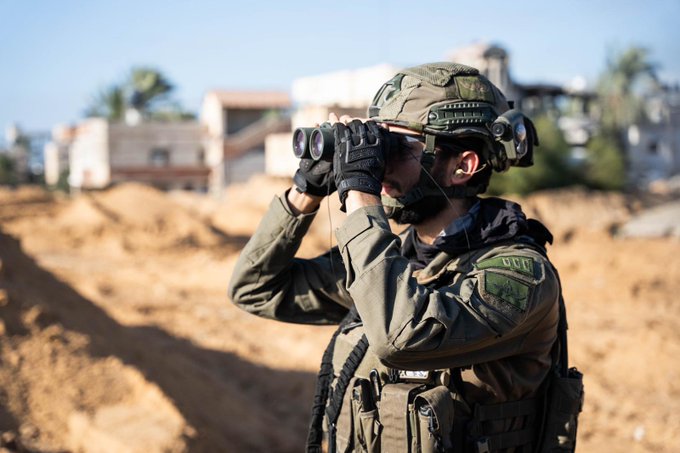Despite Egypt’s denial of the existence of smuggling tunnels beneath the corridor, security officials argue that it serves as the primary route for weapons bound for Hamas.
Both Egypt and Hamas vehemently oppose Israel’s control over the corridor due to its strategic significance.
Controlling the “Philadelphia Corridor” effectively severs the Gaza Strip’s only land connection to Egypt, forcing all movement between the two regions underground through a network of tunnels.
The corridor’s control translates to dominance over the Rafah crossing, the sole border crossing linking the Gaza Strip to the Arab world and crucial for the international travel of senior Hamas officials.
While Israel possesses intelligence on these tunnels, Egypt persists in denying their existence, claiming to have destroyed them years ago.
Recent requests by Israel to have Egyptian military units relocate away from the Gaza Strip border for IDF control have been rebuffed by Egypt.
Currently, the IDF oversees the northern, eastern, and western borders of the Gaza Strip.
Gaining control of the southern border through the “Philadelphia Corridor” would complete the encirclement of the Gaza Strip, a strategic move with implications for the demilitarization of the region after the conflict.
Hamas heavily relies on the “Philadelphia Corridor” for weapons smuggling via underground tunnels.
Even with IDF control, the corridor is expected to remain a constant target for terrorist attacks.
Reports from Gaza indicate that IDF forces attempted advances toward the corridor on December 23 but were repelled by Hamas.
The Israeli Air Force also targeted Hamas positions along the corridor.
Prime Minister Benjamin Netanyahu has repeatedly declared Israel’s intention to assert control over the “Philadelphia Corridor.”
Israel appears resolute in this decision, emphasizing its commitment to encircle the Gaza Strip comprehensively.
Despite Egypt’s opposition, it is anticipated that the country will eventually have to acquiesce to Israel’s position, particularly given the extensive weapons smuggling facilitated by Hamas through the “Philadelphia Corridor” in recent years.
The security protocol between the two nations designates Egypt to secure the corridor with a force of 750 soldiers equipped to combat terrorism and smuggling, a responsibility that appears to have fallen short in recent years.
Despite Egypt’s denial of the existence of smuggling tunnels beneath the corridor, security officials argue that it serves as the primary route for weapons bound for Hamas.
Both Egypt and Hamas vehemently oppose Israel’s control over the corridor due to its strategic significance.
Controlling the “Philadelphia Corridor” effectively severs the Gaza Strip’s only land connection to Egypt, forcing all movement between the two regions underground through a network of tunnels.
The corridor’s control translates to dominance over the Rafah crossing, the sole border crossing linking the Gaza Strip to the Arab world and crucial for the international travel of senior Hamas officials.
While Israel possesses intelligence on these tunnels, Egypt persists in denying their existence, claiming to have destroyed them years ago.
Recent requests by Israel to have Egyptian military units relocate away from the Gaza Strip border for IDF control have been rebuffed by Egypt.
Currently, the IDF oversees the northern, eastern, and western borders of the Gaza Strip.
Gaining control of the southern border through the “Philadelphia Corridor” would complete the encirclement of the Gaza Strip, a strategic move with implications for the demilitarization of the region after the conflict.
Hamas heavily relies on the “Philadelphia Corridor” for weapons smuggling via underground tunnels.
Even with IDF control, the corridor is expected to remain a constant target for terrorist attacks.
Reports from Gaza indicate that IDF forces attempted advances toward the corridor on December 23 but were repelled by Hamas.
The Israeli Air Force also targeted Hamas positions along the corridor.
Prime Minister Benjamin Netanyahu has repeatedly declared Israel’s intention to assert control over the “Philadelphia Corridor.”
Israel appears resolute in this decision, emphasizing its commitment to encircle the Gaza Strip comprehensively.
Despite Egypt’s opposition, it is anticipated that the country will eventually have to acquiesce to Israel’s position, particularly given the extensive weapons smuggling facilitated by Hamas through the “Philadelphia Corridor” in recent years.
The security protocol between the two nations designates Egypt to secure the corridor with a force of 750 soldiers equipped to combat terrorism and smuggling, a responsibility that appears to have fallen short in recent years.




